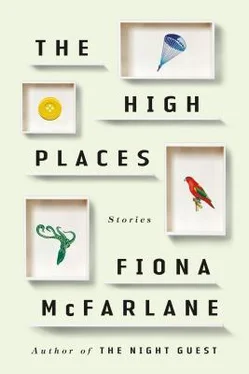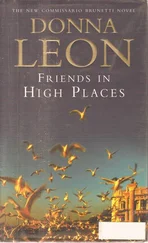Henry thought, now he had money, that he would marry her.
He didn’t tell anyone that his mother had won the lottery, and a considerable amount of his delight had to do with his windfall being secret. That was the great thing: to sit at his desk, observing as he always did the movements of the office — and Ellie’s movements among them — but as a profoundly different man, with a new and superior perspective. There was no longer anything to keep him from approaching Ellie, but he held off even so, not out of hesitation but in order to savour his own intentions. Henry noticed that she stole frequent looks at him. She had the quality of a bird among grasses, peering out in nervous excitement, eager for a mate but afraid to abandon safety. He was certain she was in the office not to make flimsy dates with different men but to find a husband.
As he left work that Friday afternoon, Henry made sure to say goodnight to Ellie. She was flattered and demure.
‘Enjoy your weekend,’ he said, and she said — she almost sang — ‘You too!’ She wore her hair pulled back with a navy ribbon.
Henry, as usual, took the stairs to the ground floor of the building — this was part of his fitness regime, to exercise his legs in the morning and the evening — and when he reached the lobby, the elevator doors sprang open and Ellie stepped out from between them.
‘Fancy that,’ Henry said. He looked at her with pleasure. Her waist was small, she had pale, plump arms, and her hair had a good-natured sheen.
Ellie stood swinging her handbag this way and that.
‘Walk me to the station?’ she asked, and he offered his arm, which she took.
It had begun to rain, and they walked beneath his large black umbrella. She tucked herself in beside him and her small, uneven steps limited his stride. He wanted to lift Ellie up in his arms the way you might a child at a parade.
‘I’d like to take you out sometime,’ Henry said.
‘That would be lovely,’ she said, with a small frown.
‘I’d like to take you out right now,’ Henry said.
‘Tonight’s impossible,’ she said. ‘I have a class on Fridays. But some day next week?’
‘What kind of class?’
Ellie gave a little smile, the bashful twin of her frown, and said, ‘Art appreciation.’
They arrived at Wynyard station and there, between the sound of the trains passing underneath the street and the sound of traffic passing over the street, she leaned her head into his shoulder for one unexpected moment. Then she ran down the steps into the station. Henry watched her bright brown head move among the commuters and disappear in the direction of the North Shore line. He considered her his girl from that moment.
* * *
Henry was fond of Sydney on a Friday afternoon. It was late winter, so the sky lowered early, and there was that weekend feeling of relief and consequence. There was a place near the station where he liked to eat after work. The whole establishment smelled boiled — boiled meat, wet raincoats, and the undersides of shoes. He ordered a hamburger — no onions, never onions — and ate it while imagining Ellie on the way to her Friday-night class. He had a vague sense that art appreciation involved bowls of fruit and flowers. But his mind didn’t stay on her for long; he began, without quite knowing it, to think about his money. He wondered how much of the ten thousand pounds his mother would give him and concluded that it would be at least half. He thought of her clutching his arm the night before, saying, ‘I’ll set you up, you’ll get married.’
Although Henry’s mother had promised to set him up, he still went to the dog track, because it was Friday. He had a weekend schedule: Friday night the dogs, Saturday the horses, Sunday lunch with his mother, and Sunday night with Kath, a girl he knew. For so long he had dreamed of a windfall, of a sudden fortune, and of what it might make possible, because every week there was a chance: the dogs ran, the horses flew, and Henry was always there to see them. There was money on every race. He won, and sometimes he didn’t. This was the greatest pleasure he knew: a little profit and a little loss. He also liked the company of gamblers. They’re cheerful people, he would say; they’re optimists.
Henry might have taken a bus to the dog track, but he preferred to walk: down George Street and Broadway, through Glebe, and into Wentworth Park. The Friday city was so festive in the rain, full of women running from warm taxis into warm houses and men standing at street corners waiting for the lights to change, holding newspapers over their heads. The gum trees lining the streets of Glebe took up the easing rain and shook it out again in heavier drops. In every one of the terraced houses Henry passed, a woman like Ellie waited for a man she loved amid the furniture and finery he had bought her.
Because he was careful with his money and lived with his mother, Henry had a small but steadily growing savings account, which was commendable for a man of twenty-eight with a mid-level job in an insurance firm. The thought of his nest egg produced in him a simple, serious pleasure as he entered the Wentworth Park greyhound track. It pleased him to think that he would be here, with money he could afford to bet, whether or not his mother had won the lottery. And because he was a man who enjoyed weighing his odds and his options, it didn’t occur to Henry to bet any more recklessly on that Friday than he normally would. Still, he had an unusually successful night. He sat in the good feeling of the crowd as it hung on those few moments that mattered, when the dogs flattened against time and won, or failed to win. Then men erupted around him in victory or regret, and there was a new surge toward the bookmakers, who stood illuminated above the throng. The bookies were the men Henry admired most of all. They spoke in a ribald and rhythmic way, singing out the odds like a sea shanty. Henry was covetous of their easy authority, which he believed came from handling large sums of money.
Henry stayed three hours, passed jokes among his track acquaintances, rolled on the balls of his feet as he waited to see which dog would emerge from the starting tangle, and collected his winnings. Then he walked to Central and took a train south. He never drank (he hated a fogged mind), and that night, as he walked home from the station — late, with the streets dark and his mother waiting for him, even in her sleep, her lamp bright in the window — he felt a new clarity to his brain, as if a frost had settled on it. It was still there the next night, at the horses, and he won again — a larger sum this time, and still without undue risk. It interested him, in an offhand way, that his weekend could look the same as always, even when his life had changed. But his wealth had already altered things: made Ellie possible, aided him at the track, kept his mind clear.
* * *
At lunch on Sunday his mother told him that she was planning to move to Victoria to live near her sister. ‘I’m giving you this house,’ she told him. ‘I want to see you settled.’
His mother was a small woman — it was as if her thrift extended even to the size of her body — but on this day she ate heartily of lamb and potatoes. She seemed to have entered a new and generous state of perpetual surprise; she’d bought lottery tickets for so many years, without the least expectation that she would profit by them. Now well-being radiated from her unlikely face, with its thick nose and thin eyebrows.
‘That’s the second day this week you’ve given me good news,’ Henry said.
His mother answered, ‘Good things come in threes,’ and Henry wondered, What will the third thing be? Ellie? A car? A big win at the dogs? And so he limited himself.
He would sell the house, of course, and buy something closer to the city, where he would be known in the neighbourhood, known by the greengrocer and by the paperboys, and he would have a straight garden path leading to his front door, flanked by a hedge that he would trim himself on Saturday mornings. Because, he thought, I’m a working man, and I won’t forget it. He would buy a car and drive to the track; he would still go to the track, because it was the spectacle, not the money, which drew him there. And there would be days with Ellie by the harbour, visiting all those brief bays on the northern shore where she lived, swimming and picnicking and maybe sitting on the water in a little boat. The benevolent future spread out before him, and he felt an immense satisfaction.
Читать дальше












